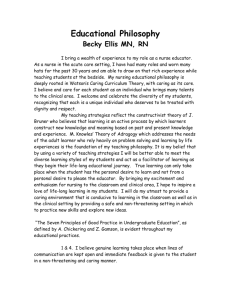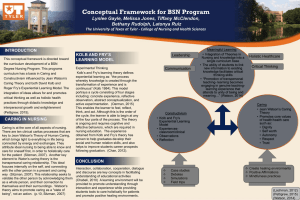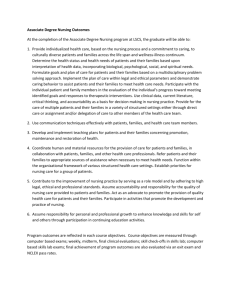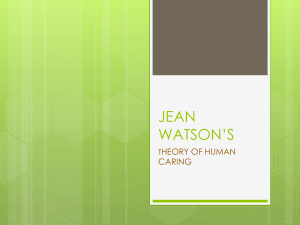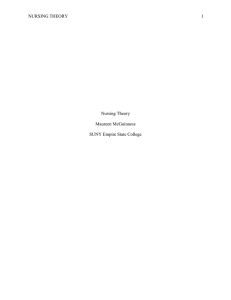Jean Watson's Caring Theory: Metaparadigm Explained
advertisement
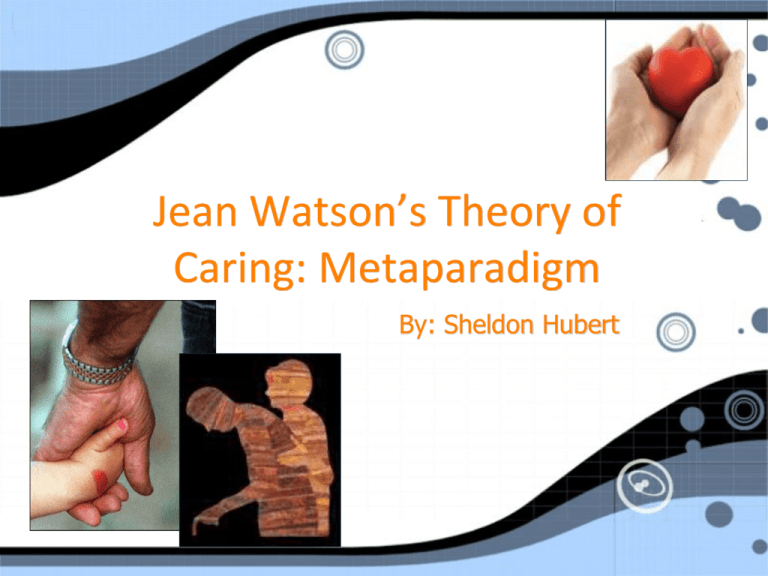
Jean Watson’s Theory of Caring: Metaparadigm By: Sheldon Hubert Jean Watson Caring is a moral ideal that can be demonstrated through carative factors (nursing interventions) that allow for contact between the subjective world of the experiencing persons (Watson/1985). THE PERSON (PATIENT) • Is subjective and unique, not objective, predictable and calculating. • Has distinct human needs, which are biophysical, psychophysical, psychosocial and interpersonal. • Is to be valued, cared for, respected, nurtured, understood and assisted. • Is a functioning whole, there is no division among the mind, body and spirit (George/2002). • Is directly influenced by their external environment. THE ENVIRONMENT • Is crucial to the holistic healing (mental, physical, social, emotional, spiritual, developmental, protective, supportive environments), which is conducive to a patients health and wellbeing. • Affects both patients and nurses within a caringhealing model. (Bernick, 2004). • Is usually designed as a home-like environment but these “systems still fall short as healing spaces” (Watson/1999). • Contains “noise, privacy, light, access to nature, color, space and smells that can have an impact on the caring-healing process” (Watson/1999). HEALTH • Is viewed holistically, as the unity between the physical, social, mental and spiritual self, with all parts working together in harmony and functioning to their full capacity. • Is a perceived by the patient and is influenced by their own unique life experiences (Bernick/2004). • Entirely includes a individuals physical, social, aesthetic and moral realms, not just their behaviour and physiology (George/2002). NURSING • Is a caring, meaningful and harmonic connective bond that is shared between the nurse and the patient (George/2002). • Is providing caring, professional and thoughtful interactions to restore and promote holistic health and to prevent illness. • Is a holistic practice that is complementary to medicine. Watsonian Praxis: Application of her Theory to My Own Practice “I reflect on what is meaningful for them and how their experiences are influencing their quality of life and peace of mind, body and soul” (Bernick/2004). Presentation References • George, J. (2002). Nursing Theories: The Base for Professional Nursing Practice, 5th Edition, Upper Saddle River, NJ: Prentice Hall • Bernick, L. (2004). Caring for Older Adults: Practice Guided by Watson’s Caring-Healing Model. Nursing Science Quarterly, 17(2) 128134 • Watson, J. (1985). Nursing: The Philosophy and Science of Caring. Colorado: Associated University Press. • Watson, J. (1999). Postmodernism and Knowledge Development in Nursing. Perspectives on Philosophy of Science in Nursing: An Historical and Contemporary Anthology, Lippincott, 471-6 Picture References • • • • • • • • Holding Heart Picture: www.ps21.gov.sg/.../2007_12/images/caring.jpg Caring Dad Picture: www.coloradoan.com/graphics/blogs/caring_dads.jpg Nursing Art Picture: www.adventurequilter.com/.../Caring-web.jpg Jean Watson Picture: www.sttialphakappa.org/Watson_Jean.jpg Patient Picture: www.spacelabs.com/patient-monitoringconnectivity/images/patient-monitoring-connectivity.jpg Environment Picture: http://nymag.com/health/besthospitals/24095 Health Picture: http://www.freehealthandwellnessinfo.com/health%20wellness%20articles% 20-%20apple%20image.jpg Nursing Picture: www.centegra.org/.../Nurse_and_Patient.jpg
